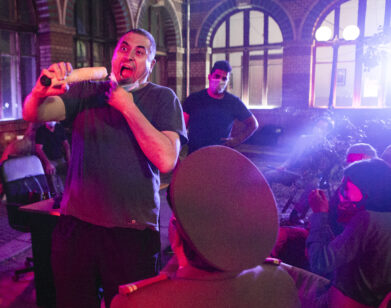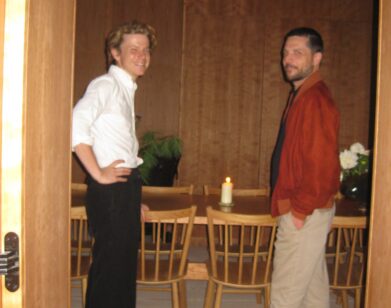Speaking in Tongues With Dennis Cooper

This could be a story of how I took a vegetarian who wrote a novel about a cannibal to a fish restaurant. But my affinity for the writer Dennis Cooper dates back long before this first meeting, all the way to my teenage years when I read several of the books that comprise his “George Miles Cycle” (Closer, Frisk, Try, Guide, Period). Reading Cooper at that age, I felt a mix of fascination (that the Cincinnati library would be open-minded enough stock this literature), arousal (its frank, bone-close depictions of sex), and revulsion (the unapologetic pedophilia, rape, and necrophilia). But even with my indoctrinated 17-year-old’s ethical code, I knew I was in the presence of a literary radical.
Since then, I’ve learned to appreciate Cooper as one of the few true experimentalists in the field of fiction, with a poetic and anti-orthodox vision that expands into fields as diverse as independent magazines, theater, criticism, poetry—even his daily blog. His latest book, The Marbled Swarm (Harper Perennial), could very well be his masterpiece (alongside 2007’s The Sluts, which meta-weaves a mystery of sex, murder, and mistaken identity through the framework of male-escort reviews). The Marbled Swarm is a mesmerizing mise en abyme that involves a ravishingly handsome Parisian youth/cannibal whose cruel-but-dandyish manner of speech, nicknamed “the marbled swarm,” works like a snake dance in luring his young prey—along with the readers—through decrepit, high-tech French estates, twisted sex experiments, fratricidal brothers, the crème of high culture, and into a nightmare of brutal, epic, Pandora’s Box proportions.
Cooper wrote the novel while living in Paris, where he has remained for the past few years because his Russian boyfriend can’t secure an American visa. He’s also currently working on an art festival at the Centre Pompidou in Spring 2012 with co-curator Gisele Vienne. The Marbled Swarm may be an experiment in Cooper’s brush with the underbelly of French sophistication, but at its heart, the novel is about the seduction of language itself—its traps, perversions, failures, and very sharp teeth.
I met up with Cooper at a restaurant in Soho the day he was giving a reading with his friend Eileen Myles. There wasn’t much for him to order on the menu.
CHRISTOPHER BOLLEN: Did you ever live in New York?
DENNIS COOPER: Yeah, for four years. It was in two spurts of two years: ’83 to ’85, and then ’87 to ’90.
BOLLEN: I don’t know what I mean by this, but I would have guessed you to be a New York writer.
COOPER: I’m such a Los Angeleno. At least I feel like I am. I’m living mostly in Paris now but I have a place in Los Feliz.
BOLLEN: You come from a background of poetry, but nevertheless the heightened language of The Marbled Swarm surprised me. I’m used to the rather straightforward, normalized Cooper grammar of your previous novels.
COOPER: I always fool around with my voice. I had made it really tight and plainspoken, like in Ugly Man and The Sluts, and I got tired of it. I decided I wanted to beef it up. I’ve always wanted to write this book, because I like layering. I wanted to try and find a voice where I could basically multitask, doing lots of things at once. So I just started fooling around. It took me a couple years to figure out the voice. And I finally found this one. It also has something to do with the fact that I was living in France and I wanted to write about that. I don’t speak French very well. I kind of like being the eternal tourist, where I don’t really understand everybody completely. And I thought that could be interesting too, something where you would have to guess at what’s going on. You know what I mean? That’s how I found this voice. It has its limits, too.
BOLLEN: You manage real gymnastics with it in the book.
COOPER: Yeah, it could do a lot of tricks. But it can’t be too sincere, and it can’t be innocent. There are all these problems. It can be annoying. It’s one of the reasons why there’s this murder mystery at the beginning. It’s to try to make it move faster, so you get used to it. Because otherwise I thought people would read three pages and go, “I’m not going to read this. This is too irritating.” Because the guy is really irritating. So there was a lot of fooling around to figure out how to make him appealing.
BOLLEN: Every book you write has an elaborate system of interwoven stories, realities, and plots. I was wondering how you lay it out? Do you have your own map when you’re writing?
COOPER: I have a graphing system. But I’ve always been fooling around with this stuff.
With The Sluts, it was mostly about how the Internet works. I did write out graphs, how the things connect, but it was really just thinking about obvious stuff, like linking from one page to another. The thing about that book was it was just mimicking a kind of conversation—voices that exist. It was just about making them intersect, the lying and the truth.
Organizing the new one was really, really hard. Maybe because the guy speaking is really clever and I’m not [laughs]. I was thinking a lot about music, about how music is mixed and how everything is happening at the same time; it just amounts to how the sound is lowered or raised. I was trying to get that with writing.
BOLLEN: The main character is from extreme wealth, but he’s a bit different from a spoiled American. He is part Gothic blue-blood and part pop-culture elitist.
COOPER: I was trying to figure out what kind of character could be this total French dandyish pretty boy, you know, interested in fashion and also be interested in stupid American culture. He talks about Disney and Givenchy. His language is “marbled” because he’s brought too much English into it. So he almost seems kind of British, which I didn’t intend. I think the mixture of my voice and the French voice into something that was kind of British was strange.
BOLLEN: There is a lot of death and violence in your books. But there has never been any idea of a fate of a character in a Cooper novel. Does that notion of a character and fate ever occur to you? It’s almost a ludicrous question when dealing with your work, because all of these traditional devices go out the window.
COOPER: I don’t think about them as characters. I make them recognizable or appealing to different degrees, but it’s all about regulating the temperature. I mean, people respond to them—people respond to certain characters like Ziggy [Try, 1995] and are touched by or really into it, but I don’t think about it that way. I think about it just like a system.
BOLLEN: A lot of writers do think of their characters as living beings.
COOPER: I know that’s the way people think. That’s why I try to make them real in a certain way, because otherwise people won’t read them. It’s fine if some readers think of them as real. It’s just not the way that I think of them.
BOLLEN: You published Closer in 1989. Do you feel that reactions about your work have changed in the twenty-plus years?
COOPER: When I was first starting out there were people who saw me as an artist and what I was doing as aesthetic and literary, but that was a minority. At the time a whole gay fiction thing was happening, and I was seen as part of that, as the bad boy. So I got really pigeonholed. So I got these labels—disgusting, awful, promoting stereotypes of gays—and that happened a lot, especially at first.
BOLLEN: As if you had some sort of responsibility to make gay men compassionate, lovely people.
COOPER: Yeah, I wasn’t interested in that at all. But the more I published, the more people see my work change and the majority takes my work seriously now. There’s still plenty of people who say, “It’s just a shame that he writes this stuff, because I hate this. It’s a good book, but this stuff is so nauseating and disgusting.” I had this idea that I could figure out a way to do it so that people could actually read about it, but it’s really impossible. There are all these kids who like my books. There are people who read it and go, “Holy shit, I couldn’t sleep. I couldn’t sit.” [laughs]
BOLLEN: When you started writing, were you surrounded by other writers who were inspiring to you?
COOPER: Not when I started. I was pretty much on my own. Even when I was in high school, I was writing and I had friends who were writers in bands, and I had some comradeship with them and people in school liked what I did. It was more like in the late ’70s with the punk thing, I started a seasonal magazine and I curated these reading events in LA. Then there was a community of writers who became my friends, and from then on it was something like that. But no, when I started writing I felt totally alone, and was writing all this really weird stuff. I really didn’t show it to anybody, because I thought rightfully that they would think that I was just sick.
BOLLEN: Do you ever think that literature is by its very nature a conservative field? Are you disappointed that writers don’t take more chances?
COOPER: I think not that many people are interested in doing that, but there’s all kinds of reasons to be an artist. There’s a reason to be a writer because you have to be one, it’s your calling, or to be successful, to be respected, to make money. Mine was to be a visionary writer. I wanted to be a genius! That sort of stuff is so outré. When people try to do something really ambitious, whether it succeeds or fails, not even just in literature but in movies like Enter the Void, people go insane because it’s so ambitious they hate it.
BOLLEN: People really hate ambition. You have done a lot of work that has transcended the page—at least the fiction page. You did a comic book with artist Keith Mayerson called Horror Hospital Unplugged. And you work on your personal website. Have you consciously mined rather youth-oriented channels of art and communication?
COOPER: I just feel like I never “moved on.” Since I was young, I’ve always been buying all the records. I just never became unexcited by new things, and I never stopped thinking things like, “Deerhunter really is the greatest band ever.” I can still do that, and most people my age can’t do that. They’re like, you know, “I’ve heard all this shit before.” I don’t know why that is; it’s my personality or something. I’m still totally excited about things, and because of this, a lot of my friends are younger that me, sometimes significantly younger than me, just because I can’t relate to people my age. [laughs] Because they don’t listen to stuff anymore. I say, “Hey, have gotten this, and this, and this? Have you read this new book?” And they’re like, “Nooo, I’m still listening to Bob Dylan or something.”
BOLLEN: That’s what’s happened to me. I’m listening to Bob Dylan.
COOPER: It happens.
BOLLEN: I don’t know, maybe it’s just I don’t have the time anymore.
COOPER: Yeah, see, I don’t have a job. Well, the blog is a job.
BOLLEN: How much of your day is devoted to that?
COOPER: A lot. Making those posts is not easy, and figuring out what to post about. It’s really a lot of work. The thing is, it’s basically just a way to process the things I’m interested in. I’ll see something I’m really interested in, and then I’ll say, “Oh, I’ll make a blog.” And while I’m making the blog post, I’m basically just having fun with it—”Oh, look at that picture.” All I do is just load everything on the blog. So it’s not a chore, it’s a way to formalize keeping up with things. But it is a huge amount of work.
BOLLEN: Do you consider it an artwork?
COOPER: Kinda. I mean, it’s not for me to say, but it seems to work.
BOLLEN: How did you come up with the term “marbled swarm?”
COOPER: I don’t know, it just happened. You know, one of those weird things [laughs], two words that fit together in my head for some reason, I don’t know. I like it.
BOLLEN: You are reading with Eileen Myles tonight. How did you two first meet?
COOPER: In the early ’80s. We were just young poets and she was publishing my magazine and we were friends and I liked her poetry, so we’ve just known each other forever. I think we feel kinship because for like punk dikes and lesbians she’s what I sort of am for the boys. So we’re kind of like the king and queen of something. [laughs]
THE MARBLED SWARM IS OUT NOW.






